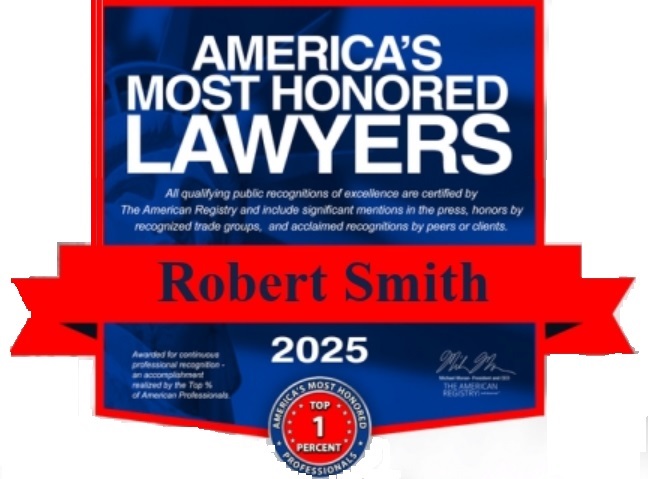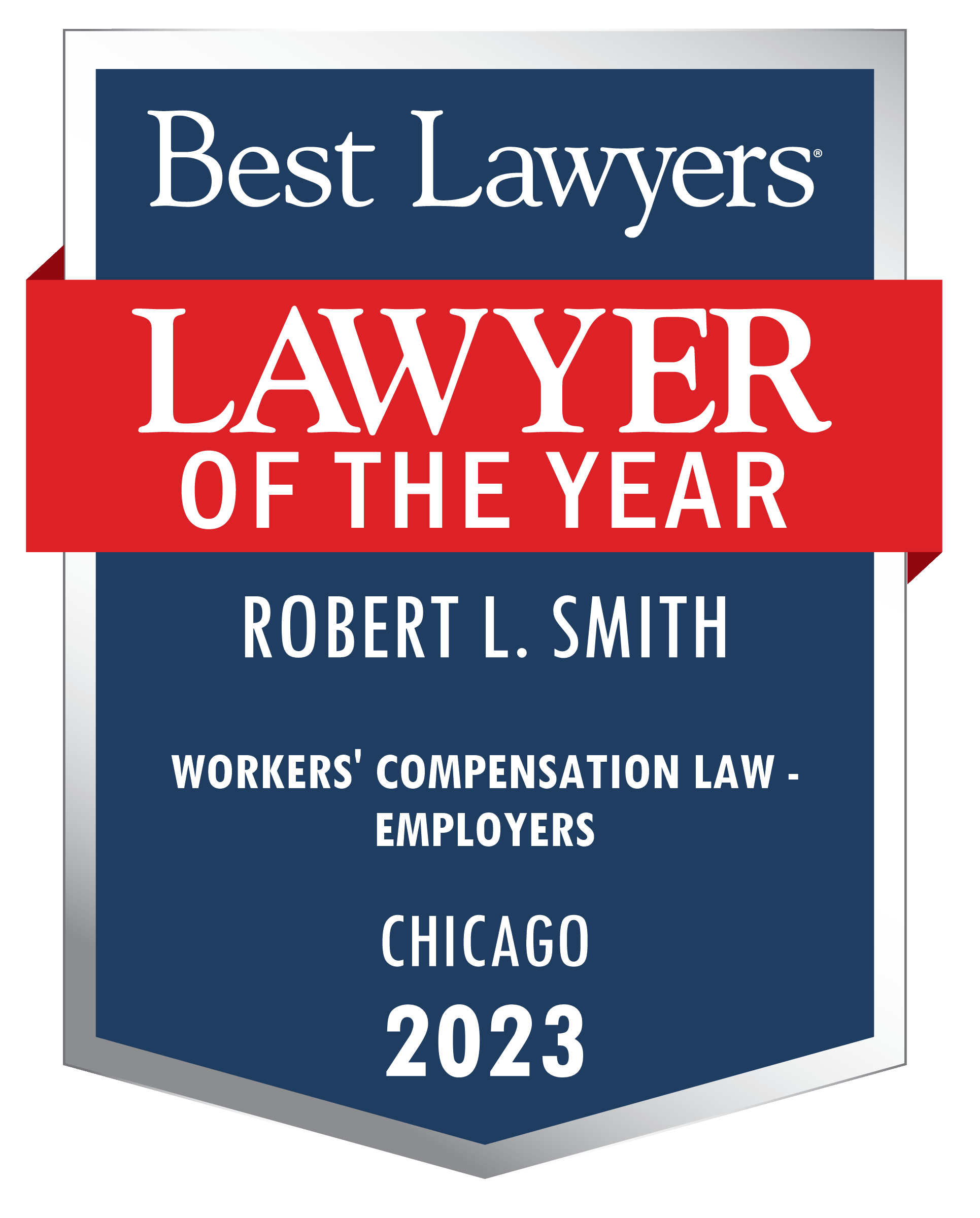Robert Smith
“The difference I have found with Robert is that he is a lawyer who calls you back” [Steven; owner of a third-party benefits administrator]
With 36 years of trial experience, Robert brings uncommon levels of insight, respect and ethics to the representation of employers faced with high exposure claims. His clients range from Fortune 50 companies to more modest employers seeking a forceful voice for their business. Robert is the former Chairman of the Illinois Supreme Court Board of Character & Fitness (2nd Dist.) and holds AV Preeminent Ratings from Martindale-Hubbell in Ethical Standards and Legal Ability.
Robert has twice been selected as Lawyer of the Year for Workers Compensation law, representing employers, in the Chicago area, by Best Lawyers/US News & World Report (2021 and 2023).
In addition, Robert was rated in 2025 as one of the Top 50 Lawyers in America by America’s Top Lawyers.
Robert has also been selected on multiple occasions by the IWCC to provide judicial training to the Arbitrator’s Commissioners and staff of the IWCC.
Robert and his team represent employers throughout Illinois, Wisconsin, and Michigan.
Robert, further, holds the specialized MSCC and CMSP licenses for all aspects of Medicare compliance.
An overview/summary from Robert’s curriculum vitae follows.
LEGAL LICENSURE
Illinois, 1989
ARDC # 6201956
Wisconsin, 2011
Bar # 1086624
Michigan, 2021
# P85181
OTHER LICENSURE
Medicare Set Aside Consultant Certified [MSCC]
Certified Medicare Secondary Payer Professional [CMSP-Fellow]
APPOINTMENTS
Illinois Supreme Court Board of Character & Fitness [Chairman; retired 2019] IWCC Rules Committee [former appointment]
RATINGS
2025 Top 50 Lawyers in America, America’s Top Lawyer
Lawyer of the Year, Workers Compensation Law, Employers, Chicago area, Best Lawyers/US News & World Report
2021 & 2023
AV Preeminent
Ethics, and legal ability, by both Bar and Judiciary 2011-2025 [Martindale Hubbell]
Illinois SuperLawyer® [multiple consecutive years and current]
Best Lawyers in America 2013- current by U.S. News & World Report
[workers compensation]
Best Lawyers in Chicago 2013- current by U.S. News & World Report [workers compensation; Chicago Tribune, Wall Street Journal, and Business Editions]
Best Lawyers in Midwest [see above]
Leading Lawyer® selection [multiple years and current]
Rated an Illinois ‘Top Lawyer’ in workers compensation by American Registry [2011-current]
Top Rated Lawyer in Insurance Law, Martindale-Hubbell [multiple years and current]
Midwest Lawyers Of The Year, American Registry [multiple years and current]
America’s Most Honored Lawyers, American Registry [multiple years and current]
Blue Ribbon Panel Evaluator, SuperLawyers®
EDUCATION
J.D., cum laude, Northern Illinois University College of Law, 1989
B.A., Beloit College, 1986
EMPLOYMENT
Gaido & Fintzen/ Chicago Partner/Department Head
TRAINING PROVIDED/OTHER
Selected on multiple occasions to provide formal judicial training to the IWCC Arbitrators, Commissioners and Staff [selected by IWCC]
Educational training seminars provided through national seminar companies on WC topics ranging from Utilization Review to Ethics, to cost containment strategies.
Regular educational training seminars for trade groups, brokers, and specific clients. Faculty Emeritus, Chicago Trauma Symposium [medical-legal issues for physicians]. Responsible for associate attorney training at large multi-state defense firm.
2013 Designated Pepsico Partnership Award recipient
2023 Certificate of Excellence Award from PepsiCo
LITIGATION MANAGEMENT
36 years of experience with all facets of electronic litigation management, including provision of training in system implementation.
Multi-state outside counsel litigation management/oversight experience
SERVICE
Board of Directors; RISCA [Risk Insurance Strategic Claims Association]
Rules Committee, Illinois Workers Compensation Commission [previous appointment]
Chairman, Illinois Supreme Court Committee on Character & Fitness [retired]
Judge; American Association for Justice, Mock Trial Competitions
Judge; ABA National Negotiation Finals/Chicago-2025
Volunteer Fly-fishing guide; Charitable foundation for cancer survivors
NOTABLE SAMPLE CASES & DECISIONS
Donahue v. Village of Rosemont: This was an exceptionally high exposure wage differential claim focusing on medical, factual, and economic factors. The successful defense for the employer showed that the petitioner made voluntary choices to limit his post-injury earnings. The trial result was an 8(d)2 award commensurate with the back surgery, along with a substantial credit for benefits paid prior to trial. Affirmed by Illinois Appellate Court [2013].
Romero v. Wright Business: In this early case involving successful use of Utilization Review, issues included a second surgery (lumbar fusion), extensive temporary total disability benefits, and a likely permanent inability to return to the pre- injury job. Independent Medical Examination evidence was woven together with witness testimony, and Utilization Review in favor of the employer. The Commission and Circuit Court affirmed:
- That a lumbar fusion was not medically appropriate.
- That the petitioner could return to full duty per the Independent Medical Examination.
- That there was a significant overpayment of temporary total disability as a result of the adoption of the Utilization Review and the Independent Medical Examination.
Jeffrey v. Village of Glendale Heights; Successful implementation of Utilization Review evidence at trial, resulting in a no-liability Decision on $1,252,000 in medical claims.
Bohentin v. Euclid Beverage: Illinois Appellate Court 2018––High exposure wage differential claim defeated. Demonstrated that action/inaction by petitioner prevented him from showing an impairment in earnings. Permanent partial disability awarded on the basis of a person as a whole despite petitioner having significant restrictions and never returning to work. This significant case also clarifies when an employer’s Maintenance benefit liability is triggered.
Fields v. Rossi: A semi dump truck driver was involved in a vehicle accident. The petitioner tested positive for controlled substance use and was subsequently terminated. Two significant aspects of this case established Commission precedent [case affirmed at Circuit Court]:
- Temporary total disability benefits may be stopped after employment termination where the evidence shows that light duty work was available.
- The Commission need not defer to the treating physician when that physician’s opinion is based on incomplete information.
O’Toole v. United: In this high exposure wage differential claim, Robert helped establish that speculation about what ‘”might” be earned in the future cannot serve as the basis for a wage loss. As a result, the employer’s liability was significantly limited.
Vargas v. Manuel Contractors: In this precedent-setting work rule violation case, multiple witnesses testified for the parties. The petitioner went back to a locked jobsite after the day’s work had been completed to retrieve a tool. He stacked two ladders and broke his arm in a fall. The Commission denied compensation.
Tallon v. INR: Evidence from Twitter and Facebook was used at trial to defeat a 19(b)/8(a)/penalty claim. Issues involved evidentiary use of electronic media.
Woods v. Macy’s: The Commission found that a fall on an escalator is not compensable. The petitioner turned when she thought she heard a door open behind her and fell down an escalator, necessitating knee surgery. She had just knocked on the HR door and thought the opening door was HR responding to her inquiry.
Sitkiewicz v. Delta Air Lines; Issue of hip replacement successfully defended in complex fact case with degenerative conditions and conflicting medical evidence.
Hernandez V. Atlas; Zero liability Decision based on credibility attacked by surveillance video
Additional tried cases involving successful implementation of Utilization Review for the employer include: Barbour v. United (leg lengthening surgery denied), Satkevicious v. O’Hare (extensive chiropractic care denied), Garnreiter v. United (psychiatric care denied), Moon v. Pepsi (discogram denied), Larson v. Pepsi (low back surgery denied based on UR and IME), Cantua v. United (discogram denied), Marchan v. Labor Network (multiple provider bills denied by IWCC), Hernandez V. Atlas (zero liability), Jimenez v. Labor Temps (extensive chiropractic, medication, and other medical expenses defeated via UR)
Multiple additional cases involving successful application of AMA impairment ratings.





